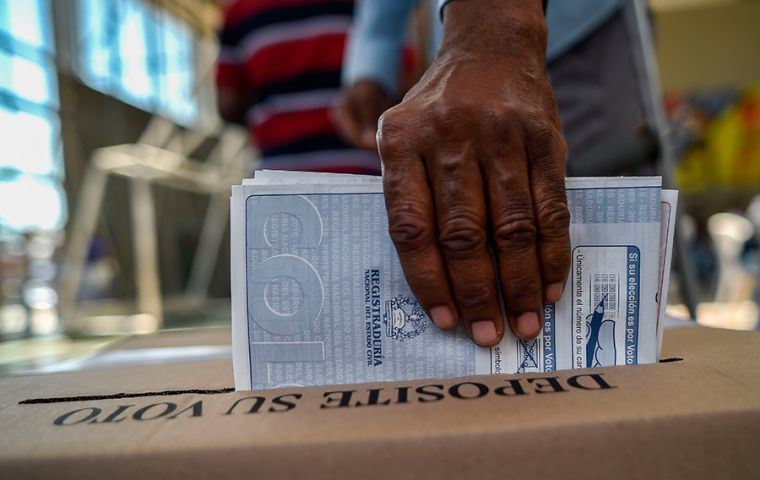MercoPress. South Atlantic News Agency
Colombian election in two weeks could represent a historic change in the country's history
 The first round of presidential election will be held 29 may, and a runoff, unless a clear majority on 19 June. Opinion polls show Petro with a significant lead
The first round of presidential election will be held 29 may, and a runoff, unless a clear majority on 19 June. Opinion polls show Petro with a significant lead The specter of assassination is again haunting the electoral campaign in Colombia, where a left-wing candidate has a real chance of becoming president for the first time in a country that has a history of political careers ending in a hail of bullets.
The first round of presidential election will be held 29 may, and a runoff, unless a clear majority on 19 June. Opinion polls show Petro with a significant lead but not enough for a first round victory.
In the 20th century, five presidential candidates were assassinated by opponents, drug traffickers or paramilitaries working in complicity with the state. Three were from the left, and the other two were liberals.
The country was gripped by more than five decades of conflict between the state and the Marxist oriented and supported Revolutionary Armed Forces of Colombia (FARC) that ended with a 2016 peace deal.
And while the level of violence has dropped since then, Colombia remains wracked by a multi-scenario conflict involving drug traffickers and several armed groups, plus plain criminal gangs.
“The specter of death accompanies us,” Gustavo Petro said last February. “It does not stop appearing to me like a flash, when I'm in a crowd, when I'm on a platform and there is a full square, someone could shoot from anywhere.”
Earlier this month, the 62-year-old senator, a former left-wing guerrilla, had to call off a public appearance after his team received “first-hand information” about an assassination plot by two paramilitaries. Two days later he did appear in the northern city of Cucuta behind bullet-proof shields from his bodyguards.
His 60-strong bodyguard has since been beefed up while local security forces have provided extra officers for his numerous trips to provincial areas that have contributed to his successful campaign.
The assassination risk “is very high”, according to Felipe Botero, a political science professor at the Andes University. ”They won't just (try to) kill Petro the candidate but it is also highly likely they will try to assassinate him if he wins the presidency,” Botero underlines.
His running mate Francia Marquez, a black environmentalist, has also received threats.
Conservative candidate Federico Gutierrez has spoken of his concern, not just for Petro but also himself, having claimed to have been threatened by the National Liberation Army (ELN), and remains of FARC that refused to accept peace terms.
“Take care of Federico Gutierrez,” said former president Alvaro Uribe, who escaped a FARC assassination attempt using explosives in 2002, but did not impede several relatives, including his father, killed by FARC.
In the history of modern Colombia a date that stands out is April 9, 1948 when liberal presidential candidate Jorge Eliecer Gaitan was shot dead on a street in Bogota.
His murder inflamed the city and set off a bloody internal conflict that, more than a half century later, has still not been extinguished.
Four decades later, communist Jaime Pardo Leal (1987), liberal Luis Carlos Galan (1989), and leftists Bernardo Jaramillo and Carlos Pizarro (1990), all presidential hopefuls, were assassinated.
Alexander Gamba, a professor at the Saint Thomas University, says there are three reasons for a “possible” attack on Petro. Firstly, Colombia has “violence professionals” and is a global source of mercenaries. Secondly, Petro's opponents have claimed his victory would be “a huge national catastrophe”, which has contributed to an atmosphere in which his assassination would almost be presented as a “patriotic act.” Lastly, the country has “never had political change” involving the left wing, which conservatives continue to link to the armed rebellion.
“In a country like Colombia, marked by political violence and with the record for the murder of social leaders, we obviously take all threats against Mr Petro seriously,” said Alfonso Prada, one of the candidate's advisors.
For its part, the outgoing government of President Ivan Duque, has said Petro “is one of the best protected people” in the country.
However this has not prevented Petro of publicly clashing with the Commander in Chief of the Colombia Army, General Eduardo Zapateiro, accusing several generals of being in the payroll of a recent cartel chief extradited to United States. Zapateiro asked for names and recalled that Petro has promised, if elected, a general pardon for jailed political offenders, which allegedly would include several of Petro's aides, when he was mayor of Bogotá, and jailed on serious corruption charges.




Top Comments
Disclaimer & comment rulesCommenting for this story is now closed.
If you have a Facebook account, become a fan and comment on our Facebook Page!